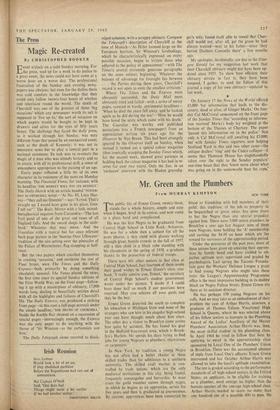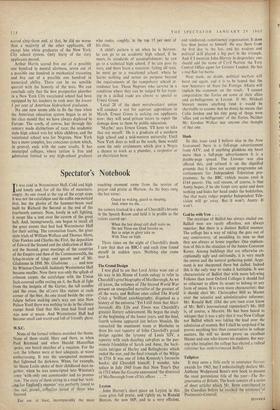Mr. Green and the Plumbers
From MURRAY KEMPTON
NEW YORK
rTitie public life of Ernest Green, twenty-three, 1 stands for a whole history, simple and easy when it began, brief in its course, and now come to a place hard and complicated.
He was the first Negro to be graduated from Central High School in Little Rock, Arkansas. He was for a while then a subject for all the news photos, a thin child with glasses walking through great, hostile crowds in the fall of 1957, still a thin child in a black robe standing with his classmates in the spring of 1958, a graduate thanks to the protection of federal troops.
There were 601 other seniors in that class at Central High School. Just fourteen of them wrote their good wishes in Ernest Green's class year book. 'I really admire you, Ernest,' the secretary of Central High School's student government wrote under her picture. 'I doubt if I could have done half so much if our positions were reversed. May you achieve all your goals and they be the best:
Ernest Green departed the south to complete his education at Michigan State and none of the strangers who saw him in his singular high-school year can have thought much about him since. The other day a visitor to Brooklyn came across him quite by accident. He has found his goal in the Bedford-Stuyvesant area, which is Brook- lyn's Harlem. He spends his days trying to find jobs for young Negroes as plumbers, electricians or carpenters.
In New York. by tradition, a young Negro has not often had a better chance 'at these skilled trades than for admission to a southern university. The skilled craft market. is con- trolled by trade unions, which are the only mediaeval institutions in this city, being feudal, frequently consanguine and hierarchic. In most cases the guild member moves through stages, in which he begins as an apprentice, serves for five years and then is graduated to journeyman. By custom, apprentices have been connected by blood or friendship with full members of their guild; this tradition. of the job as property to be bequeathed or given away. has done more to bar the Negro than any special prejudice against him. There were 3,000 union plumbers in Brooklyn a year ago last August; nine of them were Negroes, none holding the 'A' membership and earning the $4.10 an hour which are the reward for survivors of the apprenticeship period.
Under the pressures of the past year, most of these unions have given up selecting their appren- tices by family bond and have yielded to ob- jective aptitude tests supervised and graded by psychologists. Last spring the Taconic Founda- tion gave the Workers' Defence League a grant to find young Negroes who might take these tests; the League's Apprenticeship Programme office is the most impressive building in its shabby block on Negro Fulton Street; Ernest Green sits there as its assistant director.
He has perhaps 150 young Negroes on his rolls. And we may take as an embodiment of their problem the case of Arthur Harris, nineteen, a graduate of Thomas Edison Vocational High School in Queens, where he was selected above all his fellow seniors as laureate in the Plumbing Award of the Ladies' Auxiliary of the Master Plumbers' Association. Arthur. Harris was, then, the most skilful student in his plumbing class. In April 1964 he tried to follow that bent by applying to enrol in the apprenticeship class sponsored by Local One of the Plumbers' Union in Brooklyn. There was the accustomed absence of reply from Local One's officers: Ernest Green intervened and last October Arthur Harris was allowed to take the local's aptitude examination. The test is graded according to the performance standards of all high-school seniors in the United States; an applicant, to be eligible for training as a plumber, need emerge no higher than the bottom quarter of the average high-school class. Arthur Harris needed to score no more than one hundred out of a possible 400 to pass. He scored sixty-three and, at that, he did no worse than a majority of the other applicants, all except him white graduates of the New York City school system. Only thirty of the sixty applicants passed.
Arthur Harris scored five out of a possible one hundred in mental alertness, seven out of a possible one hundred in mechanical reasoning. and five out of a possible one hundred in numerical ability. There can be no sensible quarrel with the honesty of the tests. We can conclude only that the best prospective plumber in a New York City vocational school had been equipped by his teachers to rank near the lowest 5 per cent of American high-school graduates.
No one now seems able to fix the time when the American education system began to set in the class mould that we have always deplored in Europe. The south, of course, has through this century made distinctions of race; the academic state high school was for white children, and the vocational school was for Negroes. New York has a more complex, less conscious system which, in general, ends with the same results. It has municipal colleges, where tuition is free and admission limited to any high-school graduate
who ranks, roughly, in the top 15 per cent of his class.
A child's pattern is set when he is thirteen; he can go to an academic high school, if he meets its standards of accomplishment; he can go to a technical high school, if he can pass its tests, and there learn a vocation; failing all tests, he must go to a vocational school, where he learns nothing and serves no purpose beyond the requirements of the compulsory school at- tendance law. Those Negroes who survive in a condition where they can be judged fit for train- ing in a skilled trade are almost as special as Ernest Green Local 28 of the sheet metalworkers' union will conduct a test for aspirant apprentices in March. Ernest Green is seeking out applicants now; they will need private tutors to repair the damage done to them by public education.
'Maybe,' says Ernest Green, 'I'll have to take that test myself.' He is a graduate of a southern high school and a mid-western university. Until New York does as well as the south, these would seem the only attainments which give a Negro a chance to work as a plumber, a carpenter or an electrician here.



































 Previous page
Previous page